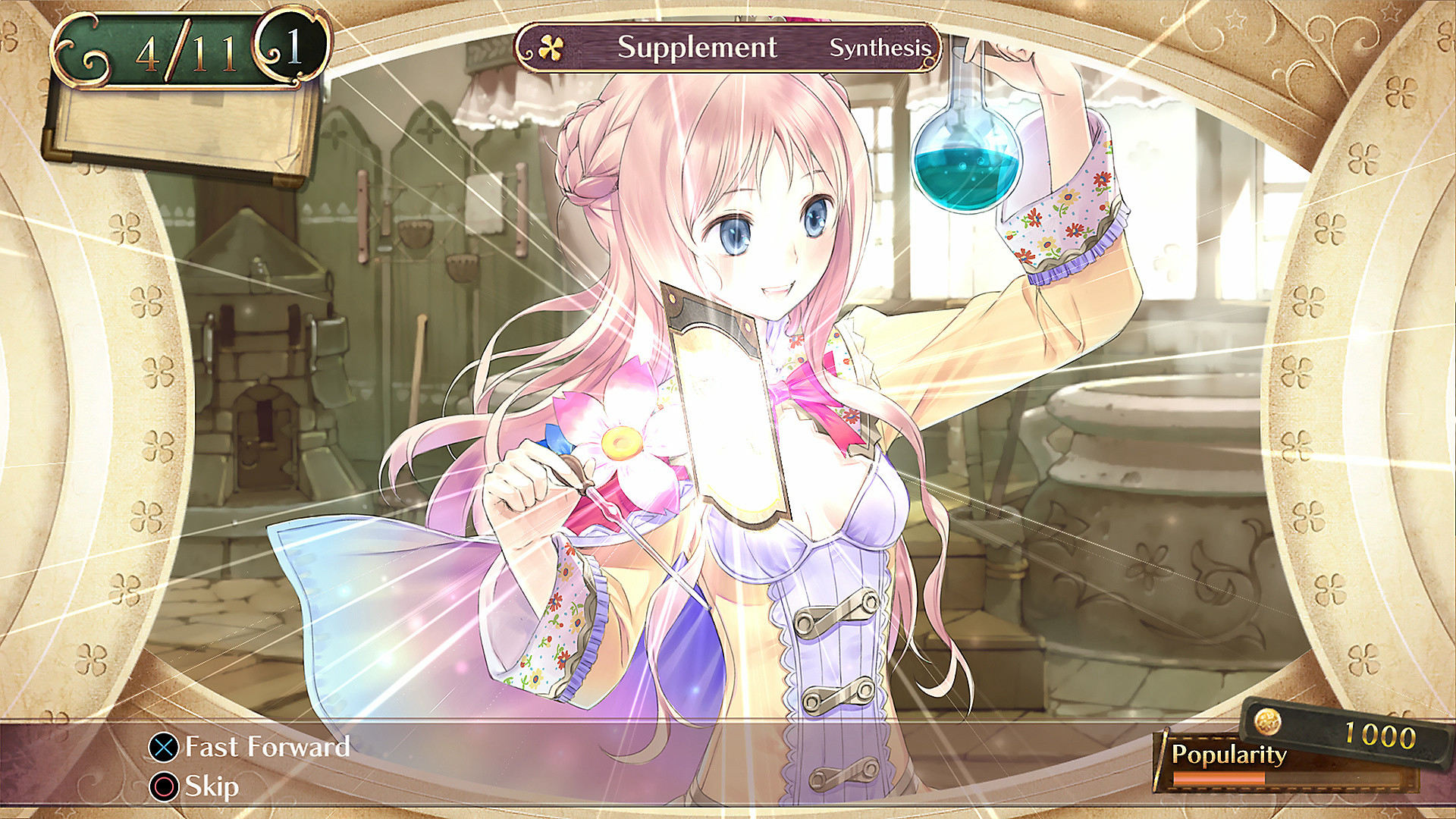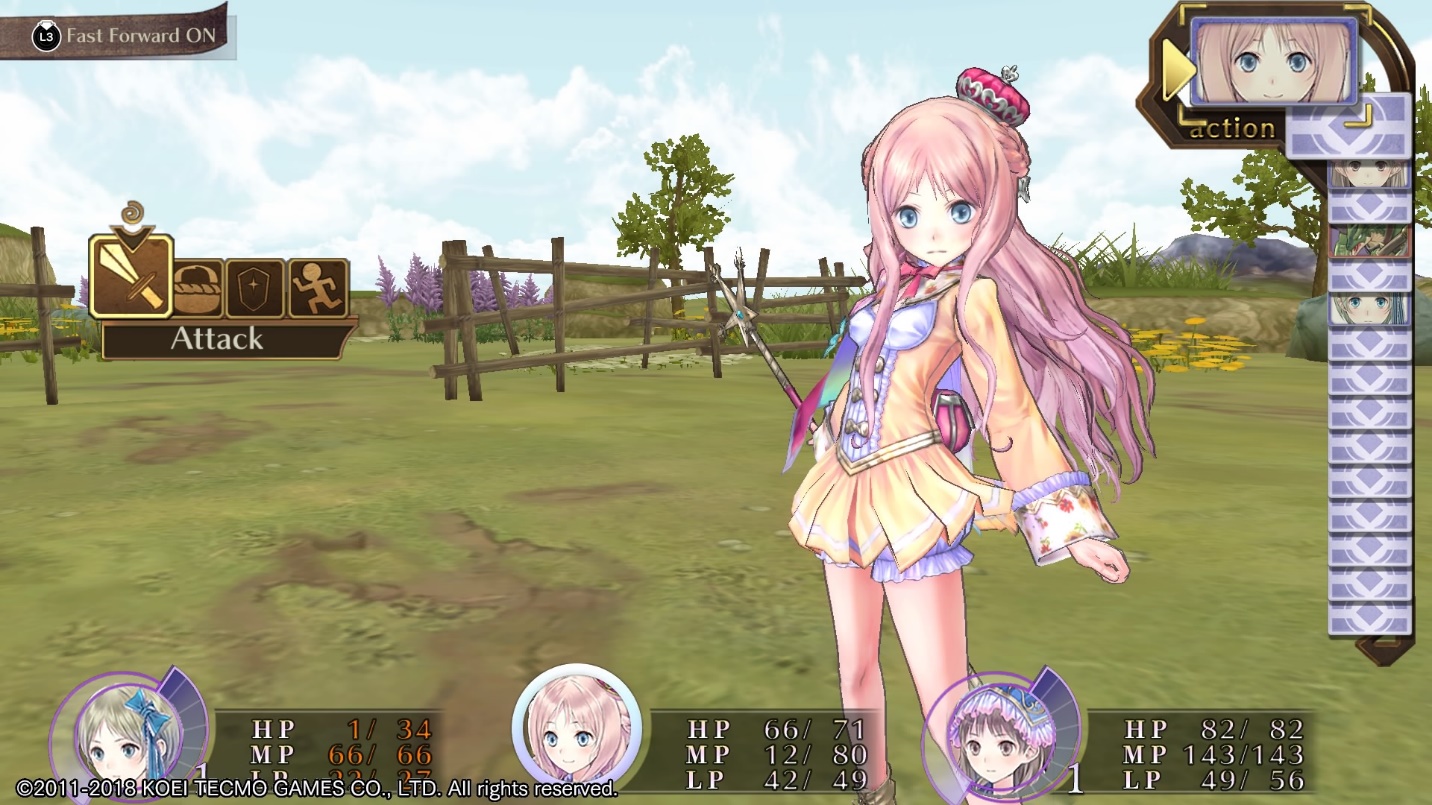Search
[{{{type}}}] {{{reason}}}
{{/data.error.root_cause}}{{{_source.title}}} {{#_source.showPrice}} {{{_source.displayPrice}}} {{/_source.showPrice}}
{{#_source.showLink}} {{/_source.showLink}} {{#_source.showDate}}{{{_source.displayDate}}}
{{/_source.showDate}}{{{_source.description}}}
{{#_source.additionalInfo}}{{#_source.additionalFields}} {{#title}} {{{label}}}: {{{title}}} {{/title}} {{/_source.additionalFields}}
{{/_source.additionalInfo}}- Details
- Category: Computer
- By Jason Gress
- Hits: 4517
Atelier Meruru: ~The Apprentice of Arland~ DX (PC)

Atelier Meruru: ~The Apprentice of Arland~ DX
Developed By: Gust/Koei Tecmo Games
Published By: Koei Tecmo Games
Release Date: December 4, 2018 (original PS3 released on May 22, 2012)
Available On: Windows, PS4, Switch (PS3 as Atelier Meruru, and PS Vita as Atelier Meruru Plus)
Genre: Role Playing Game
Number of Players: 1
ESRB Rating: T for Fantasy Violence, Mild Language, Partial Nudity, Suggestive Themes, Use of Alcohol
MSRP: $39.99 (or $89.97 for the trilogy)
(Humble Store Link)
Thank you Koei Tecmo for sending us this game to review!
Atelier Meruru ~The Apprentice of Arland~ DX is the third game in the Atelier Arland series, and a direct sequel to Atelier Totori. There may be some minor spoilers for the previous games in this review.
Merurulince Rede Arls is the princess of the local kingdom of Arls, which is set to merge with the Arland Republic in five years' time. Being a fun-loving and easy-going girl, she rarely had a worry in the world. Once the famous alchemist Totori came into town, Meruru (that is the nickname she goes by) suddenly decides she wants to become Totori's first apprentice. After overcoming her father the king's initial resistance to the idea, Meruru becomes Totori's apprentice, with conditions. One condition of that acceptance is that she must use the next five years to develop Arls to become a richer and more powerful nation so that when it merges with Arland, they can contribute more to their combined future economy. If she fails in that development, she will be forbidden from continuing with alchemy. Meruru is happy to help her country in any way she can, and is thrilled to be able to learn from Totori.
Taking place a few years after Atelier Totori, she has become quite famous for her kindness and skills. It turns out that she is also an excellent teacher, and Meruru is well on her way to becoming a good alchemist in her own right, when Astrid, Rorona’s teacher (Rorona was, in turn, Totori’s teacher) shows up with the results of one of her experiments... an eight-year-old Rorona. (While you can play these games out of order, or even this one first, I would recommend playing them in release order, as returning characters will have much more impact that way. Of course, there are some spoilers from previous entries here as well.)

Strong Points: Charming, likable cast of characters, with many returning from Atelier Totori and Rorona; excellent English voice acting; nice art style; great music; solid crafting system; plenty to explore; performance is excellent even on low-end hardware; good replay value, with lots of endings
Weak Points: Time limits significantly restrict how much you can accomplish; resolutions above 1080p are upscaled (with aliasing), not rendered at a higher resolution; menu button reactions are oddly slow on lower-end hardware; guides and/or multiple playthroughs needed to see all content; I experienced a few immersion-breaking errors, in the form of text boxes that I had to clear with my mouse (but thankfully it didn't crash outright)
Moral Warnings: Fantasy violence against natural(ish) and mystical creatures, including punis (gelatin blobs), squirrel-like beasts, humanoid creatures, ghosts, and dragons; curse words including ‘d*mn’, 'p*ss*d', ‘h*ll’; alcohol use, including by playable characters, with drunkenness shown in some scenes; there is some suggestive dialog, including fantasies of romance (both heterosexual and homosexual), breast sizes, and so on; there is a hot tub scene; one scene has a bathing woman with an arm and towel strategically covering what it must; about half of the female cast dresses conservatively, while others have lots of midriff and cleavage shown; for certain characters, breasts move when walking or in battle; underwear is sometimes visible; at least one girl is clearly attracted to other girls, with hints that others could possibly be couples; at least one major character hints that she is not interested in men; magic is used, and crafting new things in a cauldron with components is a massive part of this game; some mushrooms are poisonous and have unexpected affects on those who eat them
Like previous Atelier games, Meruru is a 3D rendered role-playing game (RPG) which focuses on a combination of crafting and adventuring in order to progress the story and ensure Meruru accomplishes what she is supposed to in the time she has. As she gains development points, she eventually ranks up the kingdom, gains population, builds structures, and gets closer and closer to the goal her father set for her.
While Atelier Rorona is more focused on tasks that the kingdom asks you to perform, and Atelier Totori is more focused on adventures, Meruru is an interesting mix of the two. In many ways, it is a subtle evolution of the formula set in the others, while also getting rid of some of the frustrating time limits and stumbling blocks from the other games. It seems 'busier' than the other entries, but also more straightforward. You are not in a constant rush to complete regular quests since you can choose to finish them at your leisure. However, there are a lot more kingdom-given tasks than before, and in order to manage your popularity and finances, you will need to complete as much as you can.
I found the main story requirements very easy to complete in the time given. What I found more challenging is aiming for some of the more interesting endings. The five years is just not enough time to see everything. Fortunately, there is a new game plus mode; unfortunately, if you want to see everything, you'll probably have to make use of it. There are tons of character endings, scenes, relationships to build, and so on, such that to see every scene is a lot of work. Unfortunately, from what I read other players say, new game plus still requires a lot of tedium since the requirements to get to the good part (post main story content) are still quite a bit of busywork that takes dozens of hours in some cases.
Adventuring, like before, is still a major part of what you do in Atelier Meruru, and you can take two other party members with you as you fight monsters, gather ingredients, and deliver various items to complete quests and help Arls develop. This one has a quite large cast of characters, including several returning from Atelier Rorona and Totori, with fan favorites like Sterk, Esty, Mimi, and even Pamela coming back for more. There are several new ones as you would otherwise expect. DLC characters from previous releases are all included here in the DX version. The Atelier series has always had excellent characters, and that is certainly the case here in Meruru.
This is the fourth Atelier game that I have played to completion, and all of the ones I have played so far seem to share quite a bit in common. You have both character and alchemy levels, collecting ingredients and crafting is critical to progress, and you are given mostly short-term goals to accomplish, with some longer-term ones as well. Atelier Meruru is a great culmination of the Arland trilogy, as it picks and chooses the best parts of Rorona and Totori, while also feeling remarkably like its own thing. It also is quite the evolution over Atelier Totori in terms of the game system, with some of the missing sorting options and other quality-of-life improvements present here. (Atelier Rorona DX is actually based on the remade version of Atelier Rorona Plus, which was released after Atelier Meruru, so all of Meruru's improvements are present in Atelier Rorona DX as well.) On the downside, Totori's graphics properly scale past 1080p, which is unfortunately not the case here (or in Rorona DX).
From an appropriateness standpoint, Atelier Meruru is pretty much just like the others, especially Totori, where most of the game is fairly clean at first glance, but there are quite notable exceptions spread throughout. Interestingly, this even happened to the Japanese rating agency when the game was released; it was originally rated for CERO B (12+), and then was quickly recalled and re-rated as CERO C (15+).
The main alchemist characters are generally not sexualized, though you can certainly put on bikinis and such in the dressing room if you so desire. Some conversations between characters can hint in a sexual direction; rarely towards Meruru, but some of the girls seem to have a strong attraction to each other while drunk or otherwise. There is a bath scene as well as a girl bathing in a river, which leaves little to the imagination except for what is required, with the presence of a towel and a well-placed arm. Romance fantasies seem to be the domain of a particular character, and she seems to revel in the idea of both heterosexual and homosexual relationships. At least one major character suggests that she has no interest in marriage in the future, and is content spending her life with her very good female friend. Outfits vary significantly, from relatively modest to large amounts of cleavage and midriff.

Higher is better
(10/10 is perfect)
Game Score - 86%
Gameplay - 17/20
Graphics - 8/10
Sound - 10/10
Stability - 3/5
Controls - 5/5
Morality Score - 74%
Violence - 7/10
Language - 7/10
Sexual Content - 5/10
Occult/Supernatural - 8/10
Cultural/Moral/Ethical - 10/10
The remaining appropriateness issues include fantasy violence against natural(ish) and mystical creatures, including punis (gelatin blobs), squirrel-like beasts, humanoid creatures, ghosts, and dragons. Curse words are present, including ‘d*mn’, 'p*ss*d', and ‘h*ll’. As mentioned before, alcohol is used, including by playable characters, with drunkenness shown in some scenes. Alchemy is a powerful quasi-science and can lead to many magic-like effects. Crafting new things requires a recipe and components in a cauldron, which is a massive part of this game. Some mushrooms and other recipes are poisonous and have unexpected effects on those who eat them, including truth telling, sickness, and others, sometimes used to comedic effect.
The PC port is reasonably solid, with great performance overall. I was disappointed to see that the rendering resolution cannot go above 1080p, even though the screen resolution can. Nothing is game-breaking, and I never had the game crash on me, though I did have the game prompt me with a pop-up box that asked me to press 'OK' (in Japanese) several times in a few battles. It sure would be nice for them to patch this issue out. It performs quite well; the game plays great even on my lower-powered GPD Win 2 at a 720p screen resolution, which has integrated Intel video. This system is much lower than the minimum system requirements on the Steam store page, but still runs great.
Atelier Meruru ~The Apprentice of Arland~ DX is a fitting conclusion to the original Arland trilogy. (Atelier Lulua is a very recent new entry in this Arland series.) If you enjoyed the first two entries in the Arland trilogy, then I would say that there is enough here to keep you interested for sure. If you would like to check out the Atelier series, you could start here, but I would recommend checking out Atelier Rorona first. If you are wondering if you should get the whole trilogy over a single entry, I would say if you like one, you are likely to enjoy them all.








